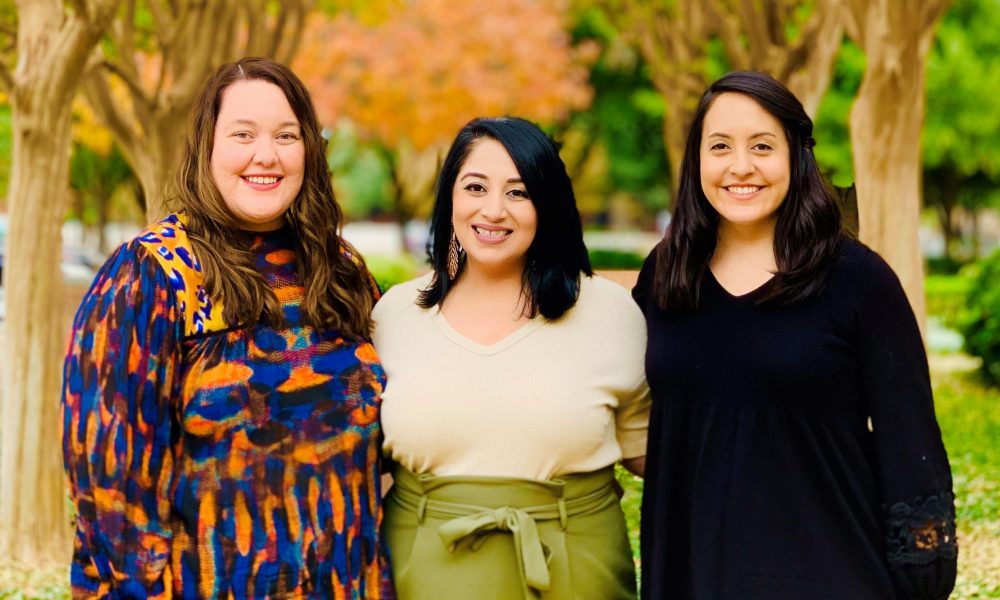

Today we’d like to introduce you to Anna Rupani, Carolina Pina and Elisandra De La Cruz.
Human Rights Initiative of North Texas was founded almost twenty years ago by some amazing women in their late twenties—a lawyer and a social worker—to help people fleeing human rights abuses from all over the world. We started our Children’s Program in 2015 after we saw a surge of unaccompanied kids trying to get to the U.S. for safety. Our Children’s Program works with kids as young as three and as old as twenty-three. All the kids have been neglected, abused, or abandoned by one or both of their parents—which means that it’s just not safe for them to go back to their home country.
Anna, our Children’s Program Director, heads up the program—and it’s her job to help our kids find a way to stay in the U.S. by representing them in family and immigration courts. She started her career working as a social worker with adolescents and came to HRI because she wanted to go back to that—to see how she could help kids have a voice in this really difficult system—to make sure that they were understood and got the kind of help they were entitled to.
Carolina, our Children’s Program Legal Assistant, helps make all of that happen—she stays in touch with the kids; she helps kids with their applications (including work permits for kids who are old enough). She started her professional career here at HRI because she wanted to give back to her community and she wanted to help kids have a future here in the U.S. Living with parents and siblings who were undocumented, she knows the struggle that our kids go through.
Elisandra, our Children’s Program Case Manager, is there to make sure that the kids are getting the social support and help that they need to succeed. Once a kid is released from government care to a family member or other sponsor, we want to make sure that the family dynamics are safe and the child integrates into their new community. Sometimes, that’s mental health support, sometimes that’s help with medical care, and sometimes it helps with school enrollment. She also leads HRI’s Youth Empowerment Program, which helps kids who want to explore careers and college after high school go through the process. She started her career with immigration nonprofits after watching her aunt go through the immigration process and realizing that her ability to speak Spanish could help a lot of people navigate this complicated system. She started seeing program development as a way to problem-solve barriers that people were facing and found her home at HRI because she felt we really put the client first.
We’re always bombarded by how great it is to pursue your passion, etc – but we’ve spoken with enough people to know that it’s not always easy. Overall, would you say things have been easy for you?
We’re not in the smooth road business. Over the past year, the current administration has made our jobs increasingly difficult. Policy changes have made it much harder for kids who should be able to find safety here in the U.S. to be able to stay. We’ve always had a 100% success rate on our cases, and that’s because we screen our cases carefully to make sure that the cases we take on meet the legal standard and we do high-quality work. To keep winning cases at such high rates in this environment (we’re still close to 100% success, but not at 100% anymore), our path to success today is totally different than it used to be. We’ve had to come up with new and complex ways to solve problems that didn’t even exist before. And, we’re having to talk to kids about really hard things that we didn’t have to talk about in the past. It’s tough to tell a 14-year-old who escaped gang violence in their home country that no matter how hard we fight, it’s a real possibility that you’re going to have to go back. It’s been really hard.
We’d love to hear more about your organization.
Our strength—and what we’re most proud of—is that we are a safe place for these kids to come. We recognize that helping someone through their legal case is not enough, especially for the kids that we serve who are grappling with so many layers of trauma. When they come here to HRI, they’re getting dual services: help with their legal case and help with whatever immediate psychosocial needs they may have. And because we recognize what they’re going through outside of immigration court, we work really hard to make sure that their experience here is kid-friendly and comfortable for a person that’s gone through what they have.
Because of changes at the federal level, cases are taking a lot longer now than they used to. That means that we get to be more creative in the way that we’re doing our work. Now, we get to see these kids grow up and we can build programming that’s responsive to that. We’re helping kids grow and go to college through our Youth Empowerment Program. We’re talking to them about how to have power over their own stories. We’re talking to them about how they can make the changes they want to see reality. We want to be their champion—to say look, you’re here, you can do this, this is a safe place for you. That really sets us apart.
What’s your favorite memory from childhood?
We all have wonderful memories of playing games with our families as kids—and those memories help us a lot. Playing the games that we played when we were little help us as make our clients feel comfortable. Those memories are part of what builds our connection.
But, the more difficult memories connect us to our clients, too. For Anna, it’s about being a first-generation American—remembering the feeling of your life hinging on one immigration agent deciding whether or not your family is allowed to come back into this country where you’ve been living. For Carolina, it’s about living with undocumented parents, and knowing first-hand what it’s like to know that even if you get help, you’re still going to be afraid about whether your parents are going to be at home when you get back from school. For Elisandra, it’s about being the first person in the family to go to college—being told that you’re not smart enough, that you’ll never amount to anything, and knowing that it just takes one person to believe in you to find the strength to push over all of those barriers.
Our clients feel like they’re family; they treat us like family; and they’ve become our family. We’re proud to see ourselves in them.
Contact Info:
- Address: 2801 Swiss Avenue, Dallas, TX 75204
- Website: www.hrionline.org
- Phone: 214-855-0520
- Email: info@hrionline.org
- Instagram: instagram.com/humanrightsinitiative
- Facebook: fb.com/hrionline
- Twitter: twitter.com/hrionline






Image Credit:
Human Rights Initiative of North Texas
Suggest a story: VoyageDallas is built on recommendations from the community; it’s how we uncover hidden gems, so if you or someone you know deserves recognition please let us know here.

















